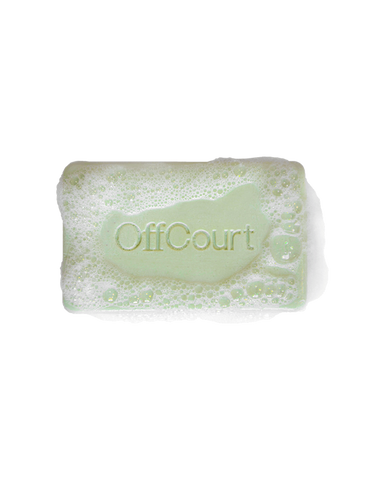Does Soap Kill Bacteria? Differences Between Regular and Antibacterial Soap
In everyday life, we are exposed to all kinds of viruses and bacteria found on the surfaces we come into contact with during the day — bathrooms, countertops, public transportation, door handles, etc. These viruses and bacteria remain on our skin and can enter our bodies when we touch our eyes, mouth, or when we eat food. That’s why it is important to regularly wash our hands and body with soap to remove these bacteria and viruses.
Antibacterial Soap
How does soap work? Antibacterial soap, also known as antiseptic soap, is a cleaning product that contains active antimicrobial ingredients that are not necessarily present in regular soaps.
An antimicrobial agent is a substance that kills microorganisms or inhibits their growth. For instance, antibiotics and antibacterial soaps are designed to kill bacteria. While bacteria often have a negative connotation, they can be beneficial. Your body requires certain bacteria to maintain a healthy and balanced skin environment.
Pros and Cons of Antibacterial Soap
There’s a common misconception that antibacterial soap is more effective than plain soap, but research shows that it’s no more effective, and some data suggests that it may even be harmful to use antibacterial soap in the long term.
Pros of Antibacterial Soap
- It is effective in killing bacteria, but it shouldn’t be overused.
- It's easy to find in most stores.
Cons of Antibacterial Soap
- Must be left on your hands for about two minutes to have any effect on bacteria.
- Overuse of antibacterial products can also kill the healthy bacteria on your skin.
- Added chemicals to antibacterial soaps can remove natural oils, making skin drier and look less healthy
- Using antibacterial soap or hand sanitizer can make people think they do not have to wash their hands as thoroughly or frequently.
Regular or Plain Soap
How does soap kill bacteria? Regular soap, often referred to as "plain" soap, is a cleansing agent made from natural ingredients such as fats or oils combined with an alkaline solution. It works by physically removing dirt, oils, bacteria, and germs from the skin through the action of lathering and rinsing with water. While it may not have specific antimicrobial properties, regular soap effectively cleanses the skin and helps reduce the spread of pathogens when used correctly.
Pros of Regular Soap
- Usually less expensive than antibacterial soaps
- It's easy to find in most stores.
- It’s effective in killing germs on hands and body, without killing healthy bacteria.
Cons of Regular Soap
- People may not wash their hands thoroughly enough for regular soap to kill bad bacteria. Remember you have to rub your hands for at least 20 seconds.
- You must look at the labels closely, some soaps include fragrances, preservatives, or other chemicals that might cause dryness or redness, especially for people with sensitive skin
Raise your hygiene standards with OffCourt's Exfoliating Body Soap
Our exfoliating bar soap is created with a sustainable palm-oil-based formula that creates a rich lather – and delivers not only deep cleansing but also serious hydration. It features white pumice and exfoliating salt particles to effectively remove dead skin cells and follows up with a profile of nourishing ingredients. Shea butter, olive oil, and sunflower seed extract work together to soothe, hydrate, and replenish vital nutrients your skin loses through sweat.
Whether you’re targeting acne, hyperpigmentation, or simply want to stop the build-up of sweat on your skin, OffCourt has got you covered. Our exfoliants for body skin are designed to scrub deep without causing damage or dryness.

Exfoliating Body Soap - Fig Leaves + White Musk
How do I prevent germs at the gym?
Gyms provide excellent opportunities for exercise, yet they can also serve as breeding grounds for germs. These microorganisms have the potential to travel up to six feet (two meters) through airborne droplets released by coughs or sneezes, lingering in the air on minuscule particles, waiting to be inhaled. Next time you hit the gym consider following these tips:
- Clean Equipment Before Use: You can catch and spread germs when you touch something with germs already on it, then touch your eyes, nose, or mouth. And since germs can stay on objects for hours, be sure to wipe down weight machines, mats, treadmills, and any other pieces of equipment at the gym before using.
- Keep Away from Anyone Coughing or Sneezing: Stay at least six feet away from anyone who seems like they have a cold or infection, and avoid any equipment they've been using.
- Wash Your Hands: After touching equipments or any surface at the gym — from doorknobs to blow dryers — remember to wash your hands with soap and water. If a bathroom is not immediately accessible, you can alternatively use an alcohol-based hand gel or wipes.
Final thoughts
In summary, both regular soap and antibacterial soap have their place in hygiene routines. For most people, regular soap is sufficient for maintaining cleanliness and reducing the spread of germs. However, individuals with specific health concerns or in high-risk environments may benefit from using antibacterial soap under the guidance of a healthcare professional. Ultimately, practicing good hygiene and reading the labels to find the best soap for your skin type and lifestyle are the most important things.
